(最新)仁爱英语八年级上册三单元教材详解
仁爱版八年级上册unit3Ourhobbies
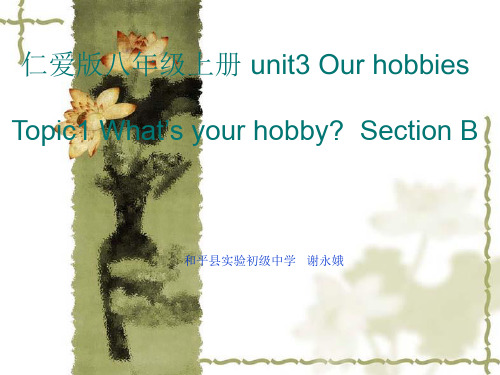
Part 1. My understanding of this lesson
1. The analysis of the teaching materials. ❖ 2. Teaching aims ❖ ●Knowledge aims ❖ ●Ability aims ❖ ●Emotional aims ❖ 3. Teaching important points ❖ 4. Teaching difficult points
I used to know little about paintings.
be interested in I used to collect stamps.
I didn’t use to play soccer.
❖ Step three: practice
❖ 1.Pair work ( using by “ I used to enjoy…,but now I don’t like it. I like/ love…”)
❖ Purpose: to practice the new phrase “used to do”, strengthen Ss’ speaking .
Purpose: make Ss practice what they learn in this period . Make them know how to work in group, how to cooperate with their teammates. In this part, we also can practice Ss’ oral English, and make them learn from each other.
❖ 2. Teaching aids
新版仁爱英语_八年级上册第三单元知识点总结
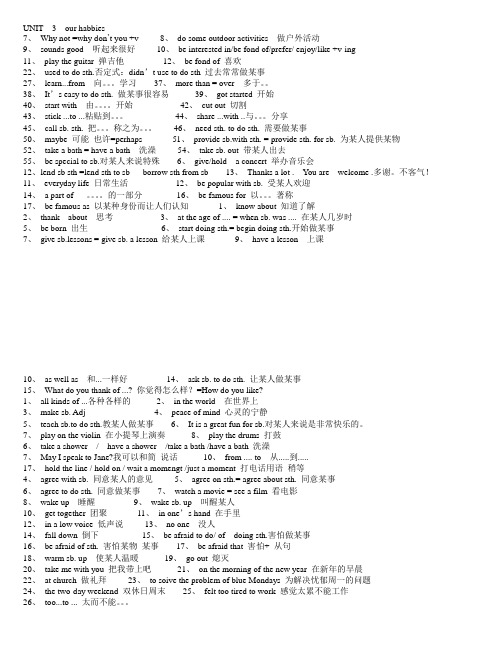
UNIT 3 our habbies7、Why not =why don’t you +v 8、do some outdoor activities 做户外活动9、sounds good 听起来很好10、be interested in/be fond of/prefer/ enjoy/like +v-ing11、play the guitar 弹吉他12、be fond of 喜欢22、used to do sth.否定式:didn’t use to do sth 过去常常做某事27、learn...from 向。
学习37、more than = over 多于。
38、It’s easy to do sth. 做某事很容易39、got started 开始40、start with 由。
开始42、cut out 切割43、stick ...to ...粘贴到。
44、share ...with ..与。
分享45、call sb. sth. 把。
称之为。
46、need sth. to do sth. 需要做某事50、maybe 可能也许=perhaps 51、provide sb.with sth. = provide sth. for sb. 为某人提供某物52、take a bath = have a bath 洗澡54、take sb. out 带某人出去55、be special to sb.对某人来说特殊6、give/hold a concert 举办音乐会12、lend sb sth =lend sth to sb borrow sth from sb 13、Thanks a lot . You are welcome .多谢。
不客气!11、everyday life 日常生活12、be popular with sb. 受某人欢迎14、a part of 。
的一部分16、be famous for 以。
八年级上册仁爱英语Unit3知识点总结
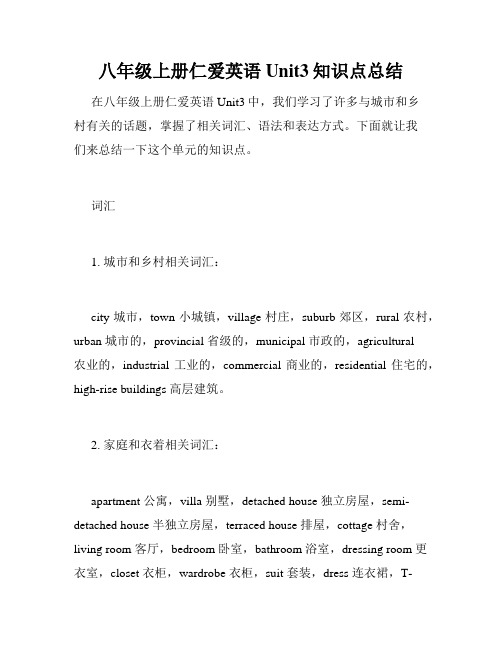
八年级上册仁爱英语Unit3知识点总结在八年级上册仁爱英语Unit3中,我们学习了许多与城市和乡村有关的话题,掌握了相关词汇、语法和表达方式。
下面就让我们来总结一下这个单元的知识点。
词汇1. 城市和乡村相关词汇:city 城市,town 小城镇,village 村庄,suburb 郊区,rural 农村,urban 城市的,provincial 省级的,municipal 市政的,agricultural农业的,industrial 工业的,commercial 商业的,residential 住宅的,high-rise buildings 高层建筑。
2. 家庭和衣着相关词汇:apartment 公寓,villa 别墅,detached house 独立房屋,semi-detached house 半独立房屋,terraced house 排屋,cottage 村舍,living room 客厅,bedroom 卧室,bathroom 浴室,dressing room 更衣室,closet 衣柜,wardrobe 衣柜,suit 套装,dress 连衣裙,T-shirt T恤衫,trousers 长裤,jeans 牛仔裤,skirt 裙子,jacket 夹克,coat 大衣。
3. 时间和工作相关词汇:weekdays 工作日,weekends 周末,Monday 星期一,Tuesday星期二,Wednesday 星期三,Thursday 星期四,Friday 星期五,Saturday 星期六,Sunday 星期日,morning 上午,afternoon 下午,evening 晚上,night 夜晚,office 办公室,factory 工厂,mining 矿业,farming 农业,medicine 医学,business 商业。
语法1. 现在进行时现在进行时表示正在进行的动作,由“be动词+动词的现在分词”构成,结构为:主语+am/is/are(be动词)+动词的现在分词。
仁爱英语八年级上册unit 3知识点归纳
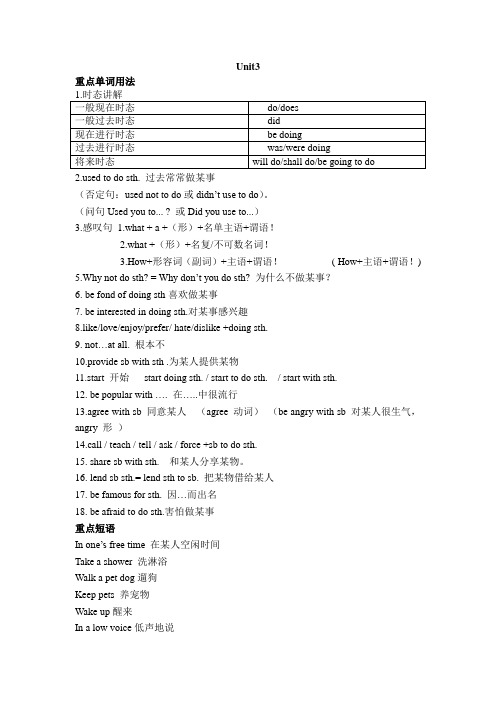
Unit3重点单词用法ed to do sth. 过去常常做某事(否定句:used not to do或didn’t use to do)。
(问句Used you to... ? 或Did you use to...)3.感叹句1.what + a +(形)+名单主语+谓语!2.what +(形)+名复/不可数名词!3.How+形容词(副词)+主语+谓语!( How+主语+谓语!)5.Why not do sth? = Why don’t you do sth? 为什么不做某事?6. be fond of doing sth喜欢做某事7. be interested in doing sth.对某事感兴趣8.like/love/enjoy/prefer/ hate/dislike +doing sth.9. not…at all.根本不10.provide sb with sth .为某人提供某物11.start 开始start doing sth. / start to do sth. / start with sth.12. be popular with …. 在…..中很流行13.agree with sb 同意某人(agree 动词)(be angry with sb 对某人很生气,angry 形)14.call / teach / tell / ask / force +sb to do sth.15. share sb with sth. 和某人分享某物。
16. lend sb sth.= lend sth to sb. 把某物借给某人17. be famous for sth. 因…而出名18. be afraid to do sth.害怕做某事重点短语In one’s free time 在某人空闲时间Take a shower 洗淋浴Walk a pet dog遛狗Keep pets 养宠物Wake up醒来In a low voice低声地说。
仁爱英语八年级上册Unit 3Review of Units 3-4(共37张PPT)

Fill in the blanks. The children went to the park last Sunday. Kangkang took many photos there. Here is one of them. The sun was shining brightly in the were the mother and her son doing sky. What _____ _____ rowing (do)? Oh, theywere ___________(row). The old man was fishing Was near the river ___________(fish). _____Maria taking was _______(take) photos? Yes, she _____(be).
功能项目二:表达喜欢和不喜欢。 I like/love it. It’s my favorite. I don’t like/enjoy it./ I hate it. I don’t mind it.
功能项目三:表达同意与不同意。
I agree./I agree with you./I think so. I don’t agree./I don’t agree with you. /I don’t think so. I thought it was just so-so. It’s nothing serious.
Read the passage and finish the tasks below. Everyone has hobbies, such asts and playing sports. Hobbies can bring pleasure and knowledge. Chen yang is a student. Two years ago, she liked playing computer games. She found nothing more interesting than them.
仁爱英语八年级上册Unit-3-Topic-3-教学设计与反思.doc

仁爱英语八年级上册Unit 3 Topic 3 教学设计与反思一、教学设计理念在设计本课时,重点突出我校“自主合作,动态生成”的课堂模式。
运用任务型语言教学模式,通过训练逐渐培养学生对语言的综合运用的能力。
与此同时,在课堂中关注学生的学习方式的转变,课堂以学生为主体,以任务为主线,重视体验参与,教师起到“设计者、研究者、促进者、协调者”的作用。
在教学中,突出课堂教学的有效性,注重听说读写的实用性,通过交际活动,逐步培养运用英语语言进行交际的习惯,从而形成积极的学习态度,促进语言实际运用能力的提高。
在课堂上,还要关注学生课堂的思维含量,通过设置有梯度的任务和小组合作学习的形式,进行有步骤有层次的训练,最终达到“动态生成”的目标。
二、本课的教学内容分析1)教材分析:本单元是《仁爱英语》八年级上册的第三单元话题三的内容。
它的中心话题是过去进行时的学习和应用。
本课是一节以语法为学习主线,以任务为语言教学模式的起始课,主要教学内容是过去进行时。
通过教学任务来整体感知过去进行时用法和语言环境。
引导学生初步学会用过去进行时表达意思。
;2)教学目标知识目标:初步感知过去进行时态,进一步培养听、说、读、写的能力。
能力目标:通过听力练习,锻炼英语听力理解能力;通过口语操练,锻炼学生说的能力和交际能力。
情感态度:以自主和合作相结合的学习方式,鼓励学生在小组中协作,共同完成学习的任务,逐步形成“团队”意识。
3)教学重点和难点。
教学重点:过去进行时基本形式及用法。
教学难点:①在对话和阅读中整体感知过去进行时语境。
②创设情景,设计话题,在交际活动掌握语法项目。
三、学情分析:学生在七年级已经基本掌握了现在进行时的用法,初步掌握现在进行时的结构和特征,已经熟练掌握了现在分词,为这一节课的学习做好了铺垫。
但是学生在实际交际中,运用was/were v+ing 这一基本结构以及由它变化出来的否定句、一般疑问句和特殊疑问句很容易出现错误。
仁爱版八年级上册Unit 3 , Topic 1

教材:仁爱版八年级上册Unit 3 , Topic 1, Section B教具:收音机、白板、图片,实物道具教学方法:本节课主要采用自主学习、合作探究的教学方法。
教学目标:一.认知目标:1.进一步巩固本单元的重点词汇,重点句型;2.巩固用 enjoy、like、love、prefer表达自己或他人喜欢和不喜欢做的事、学习用be interested in等表达自己的兴趣爱好。
3.学会用used to do sth.谈论过去喜欢做的事以及与现在做的事变化。
二.能力目标:学生在掌握语言知识后1.培养学生听,说,读,写的全方面能力,引导他们自主学习;2.通过学生的自我评价培养学生自我调控能力。
3.能根据所给出的个人爱好话题进行简单对话、能提供有关个人情况和个人爱好的信息。
4.在各项活动中学生一起参与评价,发展学生的评价能力。
三.情感目标:1.通过这堂课的学习过程,把个体学习变为合作学习,形成学习的合力。
2.培养学生的兴趣爱好和对生活、未来的一种积极态度。
3.引入竞争机制,调动全体学生主动参与,满足初中孩子的表现欲,增强自信心,通过小组合作,培养团结协作的精神。
教学重难点:重点在于熟练掌握用enjoy, like, love, prefer, be interested in表达自己兴趣爱好。
难点:将自己现在的兴趣爱好与以前比较,用used to do sth..表达自己爱好的变化。
教学步骤:Step 1. ChantStep 2. OrganizationStep 3. Revision1. Dialogue competition2. Words competition3. Ask Ss to talk about “What do you love doing?”. Use the words or the phrases “enjoy, prefer, favorite, love, like, etc.”Step4. Presentation1. Lead in.2. Listen and choose the right answers.Step 5. Practice1. Play the tape and ask a row to repeat sentences without looking at the books.2. Read the dialogue in groups.( exchange)3. Practice in pairs.4. Act out the dialogue.Step 6. Listen, read and understand.1. Lead-in.2. Play the tape and listen to 2a (once) and finish off 2b.(without looking at the book)3. Read the passage 2a once again and check the answer by Ss.4. Check the answers together.5. Mainpoints.Step 7. Consolidation.Step 8. Homework.教学过程:Step 1 ChantStep 2 OrganizationStep 3. Revision1. Dialogue competition.1) 看病2)谈论爱好 3)打电话、留言 4)谈论最喜欢的人物2.Words competition.T: Next the words will be shown by me. I will show you the Chinese meanings of some words. Please say them in English. Two words for each student. Row 5 , please.3. Make sentences with the words or phrases.(love 、like、favorite、enjoy、like…best、 be interested in、etc.)Step 4 Presentation1. Lead inT shows a picture about Part1a. T introduces the picture and write some useful language points on the blackboard.1) in one’s spare time Eg.2) need a change Eg.2. Listen and choose the right answer.T plays the tape recorder about 1a once, and choose the right answer.1)What does the boy often do in his spare time?( )A. go swimming B. go fishing C. go boating2) What does the girl often do in her spare time?( )A. listen to music B. do some outdoor activities C. watch movies3) Who needs a change?( ) A. The boy B. The girl C. Both of them4) Does the girl only watch movies in the theater? ( ) A. No, she didn’t. B. Yes, she did. C. No, he didn’t3. Play the tape once and ask a row to repeat it sentence by sentence without looking at the books.Step5 Practice1. Read the dialogue in groups. ( exchange)2. Practice in pairs.3. Act out the dialogue.Step 6 Listen, read and understand1. Lead in. Use two pictures to introduce the phrase “used to do sth”.2. Play the tape and listen to 2a once and finish off the form.Philip Used to Now Reasona movie fan. His interests are changing all the timeplay sports.3.Read the passage 2a once again and check the answer by Ss.4.Check the answer together.5.Mainpoints.1). Be interested in Eg.2). Know little about Eg.3). Share one’s interests Eg.4). Used to do sth Eg.Step 7 Consolidationbine 1b with 3. Divide the students into eight groups. Ask one student in each group to make a survey about their hobbies among their groups. Ask and answer one by one and the leader record the conclusion. Then the leader make a report for us. They can use these questions: What do you love doing now? 2) What did you use to do ?2.Fill in 1b.3.Report the data to the whole class according to the example in 3. After reporting, ask Ss to choose the winner.Step 8 Homework1. Review Section B and recite 1a.2. Write a composition about the report.2. Preview Section CBlackboard DesignUnit3 Topic1 Section B1.Practice.1)enjoy,love,like ect.2).A form of 2b2.A picture about 2aMain Points1.in one’s spare time2. need a change3. be interested in4. Know little about5. Share one’s interests6. Used to do sth Competition Table&Homework课后反思:本节课师生热情高涨,情绪饱满,师生的互动热烈。
仁爱版八年级英语上册第三单元说课稿
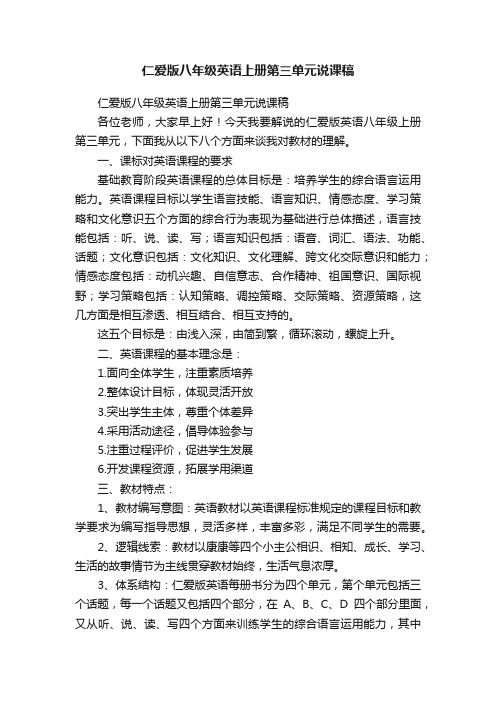
仁爱版八年级英语上册第三单元说课稿仁爱版八年级英语上册第三单元说课稿各位老师,大家早上好!今天我要解说的仁爱版英语八年级上册第三单元,下面我从以下八个方面来谈我对教材的理解。
一、课标对英语课程的要求基础教育阶段英语课程的总体目标是:培养学生的综合语言运用能力。
英语课程目标以学生语言技能、语言知识、情感态度、学习策略和文化意识五个方面的综合行为表现为基础进行总体描述,语言技能包括:听、说、读、写;语言知识包括:语音、词汇、语法、功能、话题;文化意识包括:文化知识、文化理解、跨文化交际意识和能力;情感态度包括:动机兴趣、自信意志、合作精神、祖国意识、国际视野;学习策略包括:认知策略、调控策略、交际策略、资源策略,这几方面是相互渗透、相互结合、相互支持的。
这五个目标是:由浅入深,由简到繁,循环滚动,螺旋上升。
二、英语课程的基本理念是:1.面向全体学生,注重素质培养2.整体设计目标,体现灵活开放3.突出学生主体,尊重个体差异4.采用活动途径,倡导体验参与5.注重过程评价,促进学生发展6.开发课程资源,拓展学用渠道三、教材特点:1、教材编写意图:英语教材以英语课程标准规定的课程目标和教学要求为编写指导思想,灵活多样,丰富多彩,满足不同学生的需要。
2、逻辑线索:教材以康康等四个小主公相识、相知、成长、学习、生活的故事情节为主线贯穿教材始终,生活气息浓厚。
3、体系结构:仁爱版英语每册书分为四个单元,第个单元包括三个话题,每一个话题又包括四个部分,在A、B、C、D四个部分里面,又从听、说、读、写四个方面来训练学生的综合语言运用能力,其中A、B两部分以听说为主,C、D两部分以读、写为主,通过单独练习、小组活动、阅读理解等形式,让学生在活动和交流中掌握所学知识,培养学生自主学习能力和合作创新精神。
四、以下我分话题来说一下各个话题的重、难点Topic 1 What hobbies did you use to have? 过去你有什么样的兴趣和爱好?让学生学会如何表达自己的兴趣爱好,通过过去和现在的爱好对比,引出本话题的主要语法used to .在Section A中,要掌握短语be interested in / be fond of / prefer doing等等,教师不仅要让学生掌握这些短语,还要引导学生把以前所学过的加v-ing形式的短语加以归类、总结。
仁爱英语_八年级上册第3单元课文翻译、语法总结

UNIT 3 our habbiesTopic1Section A1、 What do you do in your free time ?在空闲时间里你做什么?2、 go fishing 去钓鱼3、 enjoy reading stories and listening to music 喜欢读故事书听音乐4、 What’s your habby?你的爱好是什么?5、 a movie fan 电影迷6、 go to the movie theater 去看电影7、 Why not go out and do some outdoor activities?为什么不出去做户外活动?8、 do some outdoor activities 做户外活动9、 sounds good 听起来很好10、 be interested in 对。
感兴趣11、 play the guitar 弹吉他12、 be fond of 喜欢13、 play soccer 踢足球14、 walk a pet dog 遛狗15、 collect stamps 集邮16、 plant flowers 种花17、 climb mountains 爬山18、 fly kites 放风筝19、 go travelling 去旅行20、 go swimming 去游泳Section B21、 It must be a great fun 那一定很有趣22、 used to do sth.否定式:didn’t use to do sth 过去常常做某事(但现在不做了)23、 Kangkang is fond of swimming 康康喜欢游泳24、 What hobbies did you use to have ?你过去有什么爱好?25、 What are you looking at ?你在看什么呢?26、 I am going swimming 我要去游泳27、 learn...from 向。
仁爱英语八年级上册Unit
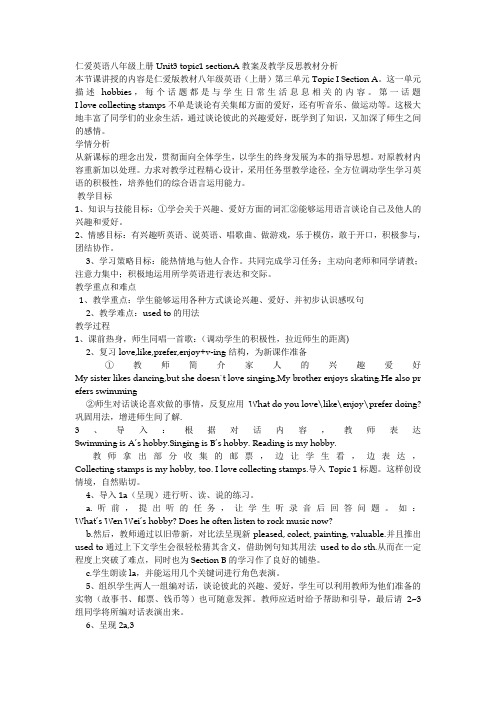
仁爱英语八年级上册Unit3 topic1 sectionA教案及教学反思教材分析本节课讲授的内容是仁爱版教材八年级英语(上册)第三单元Topic I Section A。
这一单元描述hobbies,每个话题都是与学生日常生活息息相关的内容。
第一话题I love collecting stamps不单是谈论有关集邮方面的爱好,还有听音乐、做运动等。
这极大地丰富了同学们的业余生活,通过谈论彼此的兴趣爱好,既学到了知识,又加深了师生之间的感情。
学情分析从新课标的理念出发,贯彻面向全体学生,以学生的终身发展为本的指导思想。
对原教材内容重新加以处理。
力求对教学过程精心设计,采用任务型教学途径,全方位调动学生学习英语的积极性,培养他们的综合语言运用能力。
教学目标1、知识与技能目标:①学会关于兴趣、爱好方面的词汇②能够运用语言谈论自己及他人的兴趣和爱好。
2、情感目标:有兴趣听英语、说英语、唱歌曲、做游戏,乐于模仿,敢于开口,积极参与,团结协作。
3、学习策略目标:能热情地与他人合作。
共同完成学习任务;主动向老师和同学请教;注意力集中;积极地运用所学英语进行表达和交际。
教学重点和难点1、教学重点:学生能够运用各种方式谈论兴趣、爱好、并初步认识感叹句2、教学难点:used to的用法教学过程1、课前热身,师生同唱一首歌:(调动学生的积极性,拉近师生的距离)2、复习love,like,prefer,enjoy+v-ing结构,为新课作准备①教师简介家人的兴趣爱好My sister likes dancing,but she doesn`t love singing,My brother enjoys skating.He also pr efers swimming②师生对话谈论喜欢做的事情,反复应用What do you love\like\enjoy\prefer doing?巩固用法,增进师生间了解.3、导入:根据对话内容,教师表达Swimming is A’s hobby.Singing is B’s hobby. Reading is my hobby.教师拿出部分收集的邮票,边让学生看,边表达,Collecting stamps is my hobby, too. I love collecting stamps.导入Topic 1标题。
最新仁爱版英语教案八年级(上)Unit 3

最新教学资料·仁爱版英语八年级(上)Unit 3重难点精讲考点1 辨析used to do something, be used to doing something与be used to do something used to do something 意为“过去常常做某事”,表示过去习惯性、经常性的动作或状态,和现在对比,暗示现在不做了。
to为不定式符号,后跟动词原形。
否定式有两种:didn't use to 或usedn't to。
疑问式有两种:e to...? 或Used...to do...? 但常用第一种。
答语形式与did和used的形式一致。
如:I used to go shopping on Saturdays, but now I no longer do so. 过去我经常星期六去购物,但现在我不再那样了。
be used to doing something 表示“习惯于做某事”。
to 在这里是介词,后接名词或动名词。
如:The teacher is used to going to bed late in the evening. 那个老师习惯于晚睡。
be used to do something 表示被动,意为“……被用来做……”。
如:Knives are used to cut things. 刀是用来切东西的。
考点2 agree的用法agree意为“赞成,同意”,用来表示同意某人的意见、观点等;可以单独使用,也可以接由with, to, on等引导的介词短语或接从句。
如:—Shall we go to the zoo tomorrow? 我们明天去动物园,好吗?—I agree. 我同意。
I quite agree with you. 我完全赞成你的意见。
Do you agree on this plan? 你同意这个计划吗?【知识拓展】辨析agree with, agree to与agree onagree with表示“同意”,后面接表示人的名词或代词,也可以接表示“意见,看法”的名词。
仁爱英语八年级上册第3单元课文翻译语法总结
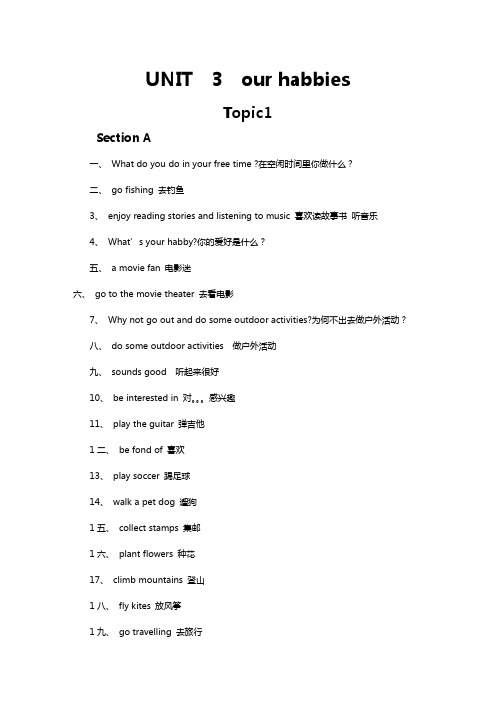
UNIT 3 our habbiesTopic1Section A一、What do you do in your free time ?在空闲时间里你做什么?二、go fishing 去钓鱼3、enjoy reading stories and listening to music 喜欢读故事书听音乐4、What’s your habby?你的爱好是什么?五、a movie fan 电影迷六、go to the movie theater 去看电影7、Why not go out and do some outdoor activities?为何不出去做户外活动?八、do some outdoor activities 做户外活动九、sounds good 听起来很好10、be interested in 对。
感兴趣11、play the guitar 弹吉他1二、be fond of 喜欢13、play soccer 踢足球14、walk a pet dog 遛狗1五、collect stamps 集邮1六、plant flowers 种花17、climb mountains 登山1八、fly kites 放风筝1九、go travelling 去旅行20、go swimming 去游泳Section B2一、It must be a great fun 那必然很有趣22、used to do sth.否定式:didn’t use to do sth 过去常常做某事(但此刻不做了)23、Kangkang is fond of swimming 康康喜欢游泳24、What hobbies did you use to have ?你过去有什么爱好?2五、What are you looking at ?你在看什么呢?2六、I am going swimming 我要去游泳27、learn...from 向。
仁爱版 英语八年级上册 unit 3 知识点

仁爱版英语八年级上册 unit 3 知识点1.询问某人的业余爱好?What’s your hobby? / What do you do in your free/spare time?(在你的空余时间你做什么?)回答:My hobby is + V-ing或V-ing+ is my hobbyMy hobbies are + V-ing...../ V-ing .....are my hobbies2. 表示喜欢的词有;like, love. enjoy, prefer, be interested in, be fond of 这些词后面也都带V-ing3. 一些反义词:take带去-bring 带来(took-brought) borrow借来与from搭配-lend借给与to搭配(borrowed-lent)4. 感官动词:look(看,看起来),watch(观看),see(看见), hear(听见),listen(听), sound(听起来)feel(感到,感觉起来), smell(闻,闻起来), taste(尝,尝起来)5. used to do sth 过去常常做某事。
否定形式:didn’t use to do sth 疑问句形式:e to do sth?6. share 分享- share sth with sb 与某人分享某物provide 提供- provide sb with sth (用某物提供给某人)=provide sth for sb(提供某物给某人)teach(教)-taught(teach 的过去式)teach sb to do sth (教某人做某事)popular 流行be popular with 在。
之间流行famous 出名的be famous with sth 因....而出名be famous as+ 职业以....身份而出名7. 玩乐器(乐器前面要用the), 球类前面不用the 如:play the violin 拉小提琴play baseball 打棒球乐器有:piano, guitar,violin, erhu, drum8. everyday 日常every day 每天9. what与how的感叹句:How+形容词/副词!What+a/an+形容词+感叹物!(感叹物不可数名词时不用a、an)形后有名用What,(后面可跟a与an),形后无名要用how,(后边没有a与an)10. 过去进行时代表过去的某个时间或某段具体时间内正在做的事情。
八年级英语上册 Unit 3 Our Hobbies Topic 2 What sweet music课文重难点讲解素材 (新版)仁爱版

3 2 课文重难点讲解【1】 !它听起来很好听!v.意为“听起来”,连系动词,后常接形容词作表语。
如:. 你的想法听起来非常好。
n.意为“声音”。
如:340 . 声音在空气中以每秒340米的速度传播。
【2】 ... I .嗯……我可以借给你一些她的歌曲光盘。
是指把东西借给别人,即“借出”,常用的句型是 . .或 . .。
如:? ? 你能把自行车借给我用一下吗?【链接】(1) 是指向别人借东西,即“借人”,常用的结构是 . .。
如:'d . 他想从你这借点钱。
(2) 但如果要表示借用某物多长时间,就要用动词。
如:I ?这本书我能借多长时间?【3】 !多么甜美的音乐啊!这是一个感叹句。
感叹句是用以表达喜、怒、哀、乐等强烈感情的句子。
一般以或开头,都用陈述句语序,后加感叹号“!”,读降调。
感叹句中,作定语,修饰名词,名词前可有不定冠词a()和形容词,结构为( )+形容词+名词(+主谓)作状语,修饰形容词或副词,结构为 +形容词/副词(+主谓)。
如:! 吴鹏跳得多高啊!! 多么有趣的电影啊!! 多么糟糕的天气啊!【4】’s .很难说。
’s +形容词+ . 干某事很……类似表达方式有:’s . 干某事很难's . 干某事很重要's . 干某事很有必要。
如:’s . 爬上这座大山很难。
’s a . 早期教小孩说话很重要。
’s .把这段话再抄一遍很有必要。
【5】 . 通常它的主题是关于爱情和日常生活的。
是形容词,意为“日常的”,作定语,相当于。
是名词短语,作时间状语,意为“每天”。
如:.看电视是我日常生活内容之一。
. 我们天天学习日常英语。
【6】 , .郭兰英、宋祖英和腾格尔因(唱)民歌而闻名。
...因……而出名;…作为……而出名。
如:Hangzhou West Lake. 杭州以西湖而出名。
a . 他作为一名歌手而出名。
【7】 , .不久,沃尔夫冈就和他姐姐娜奈尔弹得一样好。
和……一样。
- 1、下载文档前请自行甄别文档内容的完整性,平台不提供额外的编辑、内容补充、找答案等附加服务。
- 2、"仅部分预览"的文档,不可在线预览部分如存在完整性等问题,可反馈申请退款(可完整预览的文档不适用该条件!)。
- 3、如文档侵犯您的权益,请联系客服反馈,我们会尽快为您处理(人工客服工作时间:9:00-18:30)。
Unit 3Topic 1What’s your hobby ?Section A1.Ialso rent DVDs and watch them at home.rent租借,出租borrow (主语)借入向某人或某处借borrow…from…lend(主语)借出lend sb. sth. = lend sth. to sb.2. What do you often do in your freetime ?In one’s spare time = in one’s free time 在某人空闲时间里3.why not go out and do some outdoor activities ?(1)表建议的句型有:Why not = Why don’t you,后接动词原形,如; Why not/ Why don’t you go out ?What about = How about 后接动词ing,如:What / How about going out ?Shall we + 动词原形,如:Shall we go out ?(2) do some outdoor activities 做户外活动4. Maybe I need a change.change ①名词,改变,如:a great change。
②动词,改变,如:He changed his mind.(改了他的主意) ③名词,零钱,如:Here’s your change.5. I am interested in playing basketball.be interested in 对…感兴趣6. Ialso enjoy listening to music.Enjoy 后只能接动词ing形式,不能接不定式。
Like,love ,prefer 后可接ing形式,也可以接不定式。
Be interested in, be fond of 中的in,of 是介词,后只能接动词的ing形式。
7. 本课出现的一些短语(默写)遛狗听音乐爬山集邮种花去旅行去游泳放风筝去钓鱼背诗电影院户外活动Section B1.What are youcarrying ?你正拿着什么?carry的意思比较多,根据句意可以翻译为“拿,提,扛,背,运送,携带”2.Are they all from China ?Not all. Not all 并不全是3.It must be great fun. 一定很有乐趣。
4.What hobbies did you used to have ?你过去曾有什么爱好?used to + 动词原形,表示“过去曾,过去经常做某事(现在不了)”,否定形式为didn’t use to 或used not to, 如:He didn’t use to drink beer.= He used not to drink beer. 其疑问句即可用助动词did, 也可以用used, 如:Did he use to live in Beijing? = Used he to live in Beijing?5.We can learn a lot about history and people from stamps.我们能从邮票中学到很多关于历史和人文的事。
l earn…from… 向….学习…从…学习…6.本课的几个短语默写饲养宠物飞机模型玩电脑游戏明星携带照片Section C1.It was popular for more than 500 years old.它流行五百多年了More than 超过,多于(over也有同样的意思)There are more than 1000 students in Digua High School.2.It’s easy to get started.着手很容易。
get started 开始,着手It 形式主语,真正的主语是to get started3.You need the glue to stick them to the background paper.你需要用胶水把它们粘贴在有背景的纸上。
needsth. to do sth. 需要某物做某事stick.. to…把…粘贴到…上4.本课的短语默写剪掉毕业和…..分享….. 从(以)……开始制作剪贴簿保存图片Section D1.They may be everyday pets like dogs or cats.它们可以是日常的宠物,像猫和狗。
everyday= daily 日常的,每日的2.All pets provide their owners with love and comfort in their lives.所有的宠物给他们的主人在日常生活中提供爱和安慰。
Provide sb. with sth. 向某人提供某物3.I often help himtake a bath in the pond near my house.我常帮助他在我家附近的池塘洗澡。
(1) hep sb. do sth. 或help sb. to do sth. 帮助某人做某事take的前面可以加to,也可以不加。
(2) take a bath = have a bath 洗澡3. He doesn’t mind whether they are good or not.whether和if 表是否时,常可以互换,但在以下情况只能用whether, 不能用if .(1)whether 可以和or (not) 合在一起使用,也可以分开使用,但if 可以只能在口语中与or not 分开使用。
Let me know whether or not you can come.(2)whether后可接不定式,而if不能。
如:Please tell us whether to go or stay here.(3)whether可置于句首引导主语从句,而if不能。
如:_Whether_the 2000 Olympic Games will be in Beijing is not known yet.(4)whether可用在介词之后,引导宾语从句,而If则不能。
如:Success depends on whether we make enough effort.(5)whether可引导表语从句,if则不能。
如:The question is whether it is not worthdoing.(6).在有些动词(如discuss)之后,只能用whether,而不用if引导宾语从句。
如:We discussed whether we should close the shop.4.Heis very special to me. 它对我来说是很特别的。
be special to sb. 对某人是特别的Unit 3 Topic 2 What sweet music !Section A1. I am going to a concert.短语:①go to a concert 去听音乐会②give/ hold a concert 举行音乐会③at a concert 在音乐会上2. I am gong to take English lessons.take a lesson = have a lesson上课give sb. a lesson 给某人上课/给某人一个教训3. What a pity !真遗憾啊!4. 本课的词组默写拉二胡打鼓弹小提琴弹钢琴弹吉他把……借给…..Section B1. It’s hard to say. 很难说。
It’s +形容词+ to do sth. (it = 不定式)2. like … best of all 最喜欢… ,如: Li Xiang likes jazz best.= Jazz is Li Xiang’s favorite.3. Pop music often comes and goes quickly.流行音乐来得快去得快come and go 来去,来来往往4. Song Zuying and Tengerare famous for their folk songs.be famous for 因…而闻名China is famous for the Great Wall.be famous as 以…身份而出名Lu Xun is famous as a writer.5.本课短语默写因…..而著名受……欢迎民间音乐古典音乐乡村音乐流行音乐摇滚乐爵士乐Section C1.The great composer started writing musicwhen he was just a little boy.start doing sth. 开始做某事start,begin 后可以接不定式,也可以接ing形式。
2.give sb. a lesson 给某人上课3.Father Mozart decided to give his little boy music lesson. decide to do sth.决定做某事4.Soon Wolfgang played as well as his big sister. 很快,沃尔刚夫和他的大姐姐一样弹得好。
as well as 和…..一样好as fast as 和…..一样快5.at the age of 在……岁时Section D1.Good music brings people comfort and peace of mind.好的音乐给人带来安慰和内心的宁静。
2.Whenhe was eight ,his father asked a music teacher to teach him to play the piano.(1)ask sb. to do sth. 叫某人去做某事;ask sb. for sth.向某人寻求某物例:He asked the police for help(2) teach sb. to do sth. 教某人做某事3. 感叹句的两种结构:What (a,an)+adj+n +主语+动词!How + adj +主语+动词!我们观察感叹句时,从后往前看。
如果省略了动词,主语也被省略;我们根据句子结构来判断所感叹词是用What/what a/an, 还是用how。
Topic 3 What were you doing at this time yesterday ?Section A1. Hold the line, please.Hold the line = hold on = wait a moment = just a moment 为打电话用语,意为“别挂断,等一会”2.no one = nobody = not…anybody;如:There is nobody in the room. = There is not anybody in theroom.no = not…any如:I have no friends. = I don’t have any friends.3. take a shower = have a shower洗淋浴take a bath= have a bath 洗澡4.本课的一些短语(默写)和…聊天消磨时光他最喜欢的城市之一洗衣服扫除,打扫卫生洗淋浴接电话练习钢琴英语角太严肃Section B1. watch a movie/ film = see a movie/ film 看电影; go to the cinema/ movie theater 去电影院2. agree 的用法:(1) agree with 后常接人或what引导的从句,表同意某人的意见或看法,如:①I agree with you. ②I agree with what you said.(2) agree to sth.,表“同意某事”,接表示建议、计划、条件、安排等的词。
